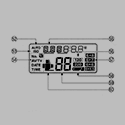|
COCKMOUTH.GIF posted:Wouldn't Skylake fall under Intel's "tick" timeframe? Isn't it better to choose Haswell as that would fall under "tock"? Is Intel just talking out of its giant rear end when it uses this tick/tock poo poo? You should buy desktops on the tock, and laptops on the tick. Wisdom.
|
|
|
|

|
| # ? Apr 28, 2024 05:24 |
|
COCKMOUTH.GIF posted:Wouldn't Skylake fall under Intel's "tick" timeframe? Isn't it better to choose Haswell as that would fall under "tock"? Is Intel just talking out of its giant rear end when it uses this tick/tock poo poo?
|
|
|
|
Shmoogy posted:If you guys are looking for an i5 2500k and have a Microcenter near you, better act quickly: Still, if I'm looking to go for a new small form factor desktop, hop on the 3570K's or wait for the new 1150 socket?
|
|
|
|
COCKMOUTH.GIF posted:Wouldn't Skylake fall under Intel's "tick" timeframe? Isn't it better to choose Haswell as that would fall under "tock"? Is Intel just talking out of its giant rear end when it uses this tick/tock poo poo? I have always done very well buying "tocks". Haswell will be no exception. The mature process on tocks makes a huge difference when overclocking. Not to mention the new microarchitecture.
|
|
|
|
Nostrum posted:I have always done very well buying "tocks". Haswell will be no exception. The mature process on tocks makes a huge difference when overclocking. Not to mention the new microarchitecture. I hope it's an anomaly but this didn't work out super well for Ivy Bridge buyers unwilling to razor off the IHS to properly apply thermal paste. A change from the more ideal heat transfer of Sandy Bridge's soldered IHS, it basically only impacts overclockers since the performance within factory TDP is fine, but when you start exceeding that on purpose the varying quality internal goop applications cost a lot of chips thermal headroom. I wonder if Haswell will receive better treatment in that regard thanks to FF's previously mentioned additional stuff on-chip; I'd hope so but Intel rightfully seems to judge overclockers as a niche they can partition pretty safely to let them find their own solutions, and while the NUC thermal failure is dumb I somehow think they'll be paying more attention in the final spindown and production process of their next gen mainstream CPUs when it comes to ensuring proper behavior within the thermal envelope designated for standard use. If that includes "woo we can totally save $(x) and we don't have to dick with soldering a thing with an inconceivable number of incredibly tiny, sensitive components!" I figure they'll take that easy over going back to soldered IHS, with overclockers "getting" to take their chances on a very very obvious form of warranty violation if they want top tier performance. Ivy Bridge only just keeps up with Sandy Bridge in the normal, "safe" overclocking arena thanks to efficiency/IPC improvements. If you're using enthusiast hardware you're looking at a bit of minor (but consequential) surgery to remove the heat transfer bottleneck on the CPU package... I do wonder if its an engineering necessity or a cost thing that they stopped using an objectively better thermal interface. Those are some wicked tiny transistors...
|
|
|
|
Can someone tell me what the difference is between these CPUs? i7-3517UE i7-3517U On paper, they seem really identical except for 200mhz in clocks but the max TDP is the same. They also seem to be priced about the same in laptops although Intel lists the i7-3517U as being more expensive. What does the 'E' stand for?
|
|
|
|
Shaocaholica posted:Can someone tell me what the difference is between these CPUs? E is embedded, supports less memory, but can also do ECC. Looks like the U lacks PCIe 3.0 support too, which is kind of interesting. You can always check on Intel ARK to get the exact details: 3517UE 3517U Compare link (might work)
|
|
|
|
It should be mentioned that the Intel ARK site loving owns and I want to have its children. Why can't all hardware manufacturers have something like that? Also having chrome set up with an ark.intel.com as a search engine setup in its address bar is clutch.
|
|
|
|
doomisland posted:It should be mentioned that the Intel ARK site loving owns and I want to have its children. Why can't all hardware manufacturers have something like that? Yeah, I just typed in 'ark 3517UE' and 'ark 3517U', custom search engines in Chrome owns hard. I have the same setup for oemstrade/Digi-Key and other nerd sites too. I think with that 3517UE listed as 'embedded' available, it's guaranteed for ~7 years or so, if I recall correctly.
|
|
|
|
Rumor has it that Intel will stop producing LGA-based processors with the release of Broadwell, leaving all solutions across all TDPs as soldered BGA SoCs. As in, no more sockets, no more buying a motherboard and installing a separate CPU. If this is true, it's hard to imagine who would really be affected. CPU upgrades without motherboard upgrades are already not especially cost-effective for those who would consider them, and so relatively rare.
|
|
|
|
Factory Factory posted:Rumor has it that Intel will stop producing LGA-based processors with the release of Broadwell, leaving all solutions across all TDPs as soldered BGA SoCs. As in, no more sockets, no more buying a motherboard and installing a separate CPU. 
|
|
|
|
Grimes posted:This sounds horrible. What if your motherboard malfunctions? You're saddled with the cost of a new CPU and motherboard? Potential to force consumers to pay for features they don't need on high-end motherboards when you want a faster processor? Sounds like poo poo.
|
|
|
|
Factory Factory posted:Rumor has it that Intel will stop producing LGA-based processors with the release of Broadwell, leaving all solutions across all TDPs as soldered BGA SoCs. As in, no more sockets, no more buying a motherboard and installing a separate CPU. This will either make motherboards really expensive as 17 different variations have to be produced for different market segments, or it will simply make high-feature enthusiast motherboards obsolete because the market is too small for them.
|
|
|
|
I'm not sure I follow you with regard to "hard to imagine who will be affected" given that it would dramatically change the whole landscape of how we currently do PC builds. I can see drastically reduced choice in (and hard times ahead for manufacturers of) motherboards. Without the capability to mix and match as we please, we lose a huge choice factor. It's easier to see who won't be affected: OEMs and brand name partners; the rest of us will be in an extremely uncertain position. What motherboard manufacturers have the infrastructure or logistic flexibility to absorb "customized CPU + any motherboard" costs? It'd almost certainly mean motherboard manufacturers pairing like with like, selling less featureful models with lower end CPUs, and high end motherboards with only high end CPUs. Right now you can pick a great mobo for your needs and trust that it will work fine with the CPU you've picked out, so if you want a high performance motherboard or one with specific features but you wisely don't want to buy an i7 if you don't need that. Or match an i5/i7 to a lower cost motherboard if you don't need the features. If this story is true it will turn the whole component selection process upside down at the core component level. It also seems like it will totally screw some other, important market sectors like HPC. Seems like really bad news to me and if true a serious move toward jeopardizing consumer choice. I'd want government intervention at that point because it seems simply anticompetitive given that Intel would be effectively forcing favorable ground for their motherboards, given fewer steps from production to market and compromised choice compared to now among competitors. I hope it's rumor mill talk and no more.
|
|
|
|
LeftistMuslimObama posted:This will either make motherboards really expensive as 17 different variations have to be produced for different market segments, or it will simply make high-feature enthusiast motherboards obsolete because the market is too small for them. They're already creating motherboards which can't overclock very well due to low vcore pumps-- if the move actually happens, I'd expect there to be 3-5 choices rather than 15+. Everything from "Cheap and functional, enjoy a 3% overclock" to "ZOMG 20 6gbs SATA PORTS, 20% OC" The overall change will probably be pretty minimal, other than annoyances with parts going bad.
|
|
|
|
I can only imagine how much backlash all the system integrators / OEMs could give Intel because this basically forces them into really close relationships with Intel. Unless Intel can articulate how this can be beneficial to both consumers and their partners, this seems like a really brazzen land grab to squeeze out any OEM that isn't in Intel's pocket already. They've already done a number of eyebrow-raising things with artificially disabling various hardware features for market segmentation reasons (another way of basically screwing over anyone trying to get value out of a company's offerings without making enough people angry enough to cause full-blown outrage). This is getting dangerously close to something that could be prosecutable... if the manufacturers of motherboards were all in the US. Because international capitalism competition is basically "lol, gently caress you Imma gonna take over your market" there may be no legal ground to stop Intel from doing this. International market regulation is a bit of a murky ground that's mostly defined by trade agreements as far as I know (and beyond really broad strokes like "free trade" v. "protectionism" there's only so many things that keep companies from curbstomping each other across the world.
|
|
|
|
So..would this mean we're going back to the Slot 1 era of Intel CPUs?
|
|
|
|
necrobobsledder posted:I can only imagine how much backlash all the system integrators / OEMs could give Intel because this basically forces them into really close relationships with Intel. I work for an integrator. We don't mind having a close relationship with Intel. We like Intel. We do mind having a close relationship from our main motherboard vendor. If we have to start relying on that vendor to provide us a unified motherboard and CPU for our systems, we're going to be very, very unhappy. Thankfully most of our business is in the server & HPC market, and the rumor only seems to be about SoCs. Unless all Broadwell processors are going to be SoCs, I'm pretty sure that this is a non-issue.
|
|
|
|
Oh well, at least AMD are still good enough. Sure, Piledriver isn't as good as i7, but you'd be hard pressed to notice the difference in most uses, and I doubt they'll drop their socketed desktop CPUs anytime soon. (Not to mention they don't have the insanely fine-grained market segmentation-through-disabled-features thing that intel is pushing). I've got an i5 in my current PC, but if intel keeps annoying me I'll be back on AMD even if it's slower both absolutely and for the price.
|
|
|
|
Factory Factory posted:Rumor has it that Intel will stop producing LGA-based processors with the release of Broadwell, leaving all solutions across all TDPs as soldered BGA SoCs. As in, no more sockets, no more buying a motherboard and installing a separate CPU. Makes sense from a signal integrity POV, if I recall correctly BGAs should perform slightly better than LGA (and remove the cost for the socket itself). It's not like Intel will be the only mobo vendor, they'll just sell trays of BGAs instead of LGAs and you get whatever mobo makers decide to offer. I mean, my company buys embedded variants from Intel for our boards, and we tell our customers "yeah, you can pick from these choices". Lot of choices for one BGA footprint, ranging from Celerons to i7s to Xeons. We're not a gigantic integrator, we just buy trays from Intel, same as everyone else. I mean, the majority of enthusiasts probably bought only 2 SKUs back when Sandy Bridge launched: the 2500K and the 2600K. S and other variants were always intended for OEMs anyway, and the proportion of single end-users buying non-K/lower-end parts probably pales in comparison to the large system integrators. With flexibility in your motherboard design, you can judiciously populate/depopulate certain components, minimizing your costs even further. Use the same PCB across models and no-load certain components if desired. movax fucked around with this message at 00:22 on Nov 27, 2012 |
|
|
|
McGlockenshire posted:Thankfully most of our business is in the server & HPC market, and the rumor only seems to be about SoCs. Unless all Broadwell processors are going to be SoCs, I'm pretty sure that this is a non-issue. Computer viking posted:Oh well, at least AMD are still good enough. Sure, Piledriver isn't as good as i7, but you'd be hard pressed to notice the difference in most uses Alereon fucked around with this message at 00:47 on Nov 27, 2012 |
|
|
|
Agreed posted:I'm not sure I follow you with regard to "hard to imagine who will be affected" given that it would dramatically change the whole landscape of how we currently do PC builds. Folks like you and me don't represent anything near a majority of PC buyers, though. Let's break down the market a bit: 1) Tablets and gizmos. Haswell and Broadwell are basically designed to open up these markets to x86 in volume. Soldered, non-user replaceable parts. No difference. 2) Laptops. Two flavors: BGA and PGA (pins-on-package, ZIF socketed). If PGA disappears with LGA, then everything is soldered, but CPUs are swapped even less in laptops than in desktops. Small gaming laptop resellers might be stymied on a level of customization, but all large-volume laptops already have custom-fabbed motherboards. Integrating the CPU at motherboard fab time just isn't that different. Especially with the push towards Ultrabooks and Macbook-style construction, processor upgrades generally just aren't offered except 1) to differentiate a small number of low end and high end systems, or 2) on larger-TDP corporate-grade systems like 14"-15" ThinkPads and Latitudes. Macbook Pros have already shown that you can do a professional-grade mobile workstation for all but the most extreme of needs using a small number of SKUs, and the CPU is a soldered BGA. Not everyone can be Apple and build systems the same way, but few end-users really need to finely pick their processor to the nearest 100 MHz, either. A reduction in SKUs from Intel means less price discrimination of CPU models, but Intel's pricing has reflected the reality that few consumers are willing to pay $1,000 a chip for years, anyway. There is a smaller range in which to discriminate, and if Intel does move away from discrimination within the larger chips it's just because they'll be pushing silicon into smaller devices, splitting hairs on TDP rather than clock speed. So, people affected = small businesses, luxury good customers, and maybe the rare person who would discriminate on non-clockrate features (which may or may not actually exist as a differentiation point on Broadwell). 3) Desktops, which can be divided into A) people who buy a prebuilt desktop, and B) schmucks like us who build 'em. Group A is dwindling, and they and the system builders who serve them would generally be fine with BGA CPUs for the same reasons laptop users are: end-users generally don't upgrade without replacing a full machine, and system builders generally offer a small selection of CPUs and can just as easily solder them during motherboard fab as have a worker install a socketed chip. Group B, enthusiast schmucks, are probably the most likely to cry foul over this, but hang on a second and think about the CPUs that get recommended in the system building thread:
As long as those three choices are preserved, enthusiasts don't really lose any choices compared to what they get now. Just about the only common scenario that gets dropped is moving some same-gen components around when upgrading one machine and cannibalizing its old parts to upgrade a second system. But the only thing this prevents, practically, is moving the CPU when the target machine has a smaller motherboard size. Repair is made more expensive with motherboard failures, as these require CPU replacements as well. This wouldn't affect in-warranty systems, since the end-user cost is the same and refurbishing the broken parts would work the same way, and the net number of CPUs flowing to/from manufacturers is zero, and the number going to/from Intel for warranty reasons is already miniscule. For out-of-warranty systems, generally aren't those old enough where upgrades are considered anyway? If not, then used parts are often considered and available, whereas new parts have generally been phased out. 4) Workstations and servers Maybe you're losing out on buying a dual-socket system with one CPU now and populating the second socket later, but is that really a common thing to do any more? Servers have been moving in the direction of the entire node being the fundamental component to add or replace when more capacity is needed, not adjusting individual servers. So, bottom line, not a heck of a lot of the market is affected all that much. Assuming the rumor is true.
|
|
|
|
Factory Factory posted:Maybe you're losing out on buying a dual-socket system with one CPU now and populating the second socket later, but is that really a common thing to do any more? Servers have been moving in the direction of the entire node being the fundamental component to add or replace when more capacity is needed, not adjusting individual servers. Alereon fucked around with this message at 01:37 on Nov 27, 2012 |
|
|
|
This reminds me of all the bellyaching when northbridge functions were moved on the processor die. The This will certainly make RMAs with ODMs much more interesting. If some capacitors on your Gigabyte motherboard takes a dump, will they pry out the BGA CPU and bin that to reattach to a 'refurbished' board later?
|
|
|
|
Maybe Intel is betting on motherboard manufacturers to shift their business models elsewhere? Maybe strong arm those companies into purchasing pre-fabricated components directly from Intel to use in the devices they create? If that's the case then holyyyyyyy poo poo is that some anti-competitive, monopolistic maneuvering. That's also a pretty big "bet it all on red" kind of move that I can't see any company making. Then again, look at Microsoft & Windows 8.
|
|
|
|
canyoneer posted:This reminds me of all the bellyaching when northbridge functions were moved on the processor die. The You can rework BGAs yeah, but it might be more cost effective for them to simply replace the entire mobo + CPU combo. I guess the irritating part of that will be getting a new LAN MAC address too; I assume everyone who shipped defective 6-series chipsets recycled assigned MACs after destroying the old boards (or kept 'em if they reworked, I guess). quote:Maybe Intel is betting on motherboard manufacturers to shift their business models elsewhere? Maybe strong arm those companies into purchasing pre-fabricated components directly from Intel to use in the devices they create? If that's the case then holyyyyyyy poo poo is that some anti-competitive, monopolistic maneuvering. That's also a pretty big "bet it all on red" kind of move that I can't see any company making. Then again, look at Microsoft & Windows 8. Instead of buying the socket from someone, they replace the BOM item with a BGA from Intel. They already get the chipsets from them.
|
|
|
|
movax posted:You can rework BGAs yeah, but it might be more cost effective for them to simply replace the entire mobo + CPU combo. I guess the irritating part of that will be getting a new LAN MAC address too; I assume everyone who shipped defective 6-series chipsets recycled assigned MACs after destroying the old boards (or kept 'em if they reworked, I guess). This sounds like it would introduce some more risk for the ODM's. If the cost to replace the entire board goes up as such, the logical paths would be warranties getting crappier or QA and design cutting fewer corners. I can tell you which I would prefer.
|
|
|
|
canyoneer posted:This sounds like it would introduce some more risk for the ODM's. If the cost to replace the entire board goes up as such, the logical paths would be warranties getting crappier or QA and design cutting fewer corners. Or spend the same amount on QA and design, but assign it to fewer SKUs. Asus, ASRock et al. make something like 40 SKUs per socket at a time, not including OEM parts. Turn that into fewer board variants with different CPUs.
|
|
|
|
Alereon posted:I don't know how you can see benchmarks of AMD FX-series processors and say they're "good enough." Yeah, obviously if you're doing something that doesn't depend on the CPU you won't notice much, but that's also true of a five year old machine. Start playing Skyrim and you'll notice framerates being cut in half in high-action sections, while even last-generation Intel processors continue to run at 60fps. Granted Piledriver can almost catch up on workloads that can use all 8 cores, but how common is being able to use four cores, much less 8 on desktop workloads? Keep in mind that these huge performance gaps exist on today's workloads, tomorrow's games that don't have to keep CPU usage low enough to run on a console is going to see a much larger difference. Skyrim is known for being CPU heavy, others will fare better, but only because they skew more to GPU performance. The ultimate point is there are definite scenarios in which you will notice the difference. HalloKitty fucked around with this message at 10:35 on Nov 27, 2012 |
|
|
|
Factory Factory posted:Or spend the same amount on QA and design, but assign it to fewer SKUs. Asus, ASRock et al. make something like 40 SKUs per socket at a time, not including OEM parts. Turn that into fewer board variants with different CPUs. I'm opposing doing away sockets not because of upgradability, because if I want a high-end CPU for instance I'll bet my rear end that Asus & co are going to rip me off as much as they can by putting redundant stuff on the board that I don't need, which is something I can avoid now with the CPU and mobo separate.
|
|
|
|
HalloKitty posted:Skyrim is known for being CPU heavy, others will fare better, but only because they skew more to GPU performance. The ultimate point is there are definite scenarios in which you will notice the difference. Sure, they really are slower, and I even said as much. Some CPU-intensive games will be slower in some parts. Some CPU-intensive activities, especially single-threaded ones, will take longer. Still, you will get a comparable experience - kind of like moving sideways in a console generation. (For contrast, imagine moving to ARM.) In other words, it is still possible to take part in modern PC usage (be it gaming or productivity) without an intel CPU.
|
|
|
|
Factory Factory posted:Or spend the same amount on QA and design, but assign it to fewer SKUs. Asus, ASRock et al. make something like 40 SKUs per socket at a time, not including OEM parts. Turn that into fewer board variants with different CPUs. The question though, is why do so many board variants exists? I'd guess that when you're catering to the BIY crowd you have to offer a lot of configurations to appeal to that very particular crowd. I agree fewer drat board variants would be nice but the business model seems to necessitate (or at least favor) SKU bloat.
|
|
|
|
Crackbone posted:The question though, is why do so many board variants exists? I'd guess that when you're catering to the BIY crowd you have to offer a lot of configurations to appeal to that very particular crowd. I agree fewer drat board variants would be nice but the business model seems to necessitate (or at least favor) SKU bloat. Many variants share the same exact board with minor differences that are easily added in or taken out for real cheap like extra PCI-E 16x slots, and if your competitors are going to SKU flood, you would also do the same to maintain consumer mindshare, since it's close to impossible to standout with just one model as overclocking and performance advantage are almost nil these days.
|
|
|
|
I was outraged too about about the socket drama, but I have never swapped a processor out of machine for a new one. I have changed motherboards and kept the proc a number of times though. Like that HORRIBLE KT800 board for the Socket 754 Athlon 64 to a less horrible but still awful Nforce 3. I've also gone with smaller form factors when repurposing a desktop to an HTPC. So it's not so much the lack of swapping procs, its the swapping of motherboards and lack of choice in features as the problem in my eyes.
|
|
|
|
I've put a faster processor in an older board and had it be a significant upgrade. Going from a 2.2ghz dual core to a 3ghz quad core is a drat good boost for my upgrade budget of next to nothing and made my system useful for several more years. I've also swapped chips to new motherboards, usually because one died (stupid lovely capacitors
|
|
|
|
pienipple posted:I've put a faster processor in an older board and had it be a significant upgrade. Going from a 2.2ghz dual core to a 3ghz quad core is a drat good boost for my upgrade budget of next to nothing and made my system useful for several more years. Yeah, I feel like 775 was a bit of an exception simply because it saw some relatively large jumps in performance/cores during its lifespan. You could start out with a launch E6400 and end with a Q9500. With Sandy Bridge though, I think most enthusiasts started out with quad-cores, and there isn't as large of a performance delta between the most modern SKUs and launch SKUs. It does suck though I suppose if you built a Sandy system with an i3 to start with, but I don't know how large the population of home builders doing that is.
|
|
|
|
movax posted:Yeah, I feel like 775 was a bit of an exception simply because it saw some relatively large jumps in performance/cores during its lifespan. You could start out with a launch E6400 and end with a Q9500. With Sandy Bridge though, I think most enthusiasts started out with quad-cores, and there isn't as large of a performance delta between the most modern SKUs and launch SKUs. This was with Socket AM2/+/AM3 (bios updates added support for newer chips to my AM2 board) but 775 was pretty long lived too. I usually build myself a middle of the road system because I don't game much, but an upgrade path being available is something I'm used to having. Swap out chip for a faster one that's now inexpensive because it's two years later, add 2 more sticks of RAM, voila! it feels practically new again. My current system is going on 6 years old. Started with an Athlon 64 X2 4200+ and 4 GB of ram late in 2006, upgraded to an Athlon II 640 and 6 GB of ram in 2010. Could still add more RAM but the processor is almost the fastest the board can stand, performance gains from finding whatever the fastest 95W TDP Phenom II it could take are not going to be worth the money or effort.
|
|
|
|
movax posted:Yeah, I feel like 775 was a bit of an exception simply because it saw some relatively large jumps in performance/cores during its lifespan. You could start out with a launch E6400 and end with a Q9500.
|
|
|
|
I care waaaay less about upgrades and way more about the loss of choice as a consumer. I don't want to have to select from pre-bundled gamer xtreme packages if I want to overclock a high end CPU, with an alternative for multithreaded performance in the range I am looking for likely being a server package that has way more poo poo than I need. Both of those options cost too much. We can talk about how realistically, in terms of what people bare-bones need, there's "bloat" in the motherboard market, but I think that so long as the market is lively and can sustain itself through ordinary commerce, the competition offered by an abundance of choices is a really good thing. I guess it comes down to an admission that while I don't think unrestrained capitalism is a good thing at all, I'm strongly opposed to the idea of that much integration and control over the general market, regardless of the strength of the core product (their badass CPUs, I guess, in this case). Intel just shouldn't have that much power to make choices for you. Intel and whatever motherboard companies offer the best cash prospects for them shouldn't have that much power, either. It's, frankly, too much. I regret this may be a niche concern, since so many people would never in a hundred years want to build their own computer and are effectively already letting Dell or whomever do something that might as well be this, already. But in what way is fewer options and a straightforward attack on motherboard manufacturers' business models a good thing, exactly? If there is an extremely compelling technological reason that this is required that's one thing, if it solves some otherwise unsolvable problem with shrinking further or whatever maybe I'll learn to live with it and try to be willing to spend more for the same level of product quality that I now enjoy. However, if it's just the tidying of options for no other reason than they stand to make more money from it at the expense of consumer choice, gently caress that. Agreed fucked around with this message at 01:12 on Nov 29, 2012 |
|
|
|

|
| # ? Apr 28, 2024 05:24 |
|
There are a half dozen reputable ODMs to purchase motherboards from these days. If there's money to be made pairing an overclockable i5 with a vanilla-esque board that supports overclocking, I'd bet one of them will do so. Motherboards are somewhat of a commodity item, and I don't expect anyone would want to leave money on the table.
|
|
|

































